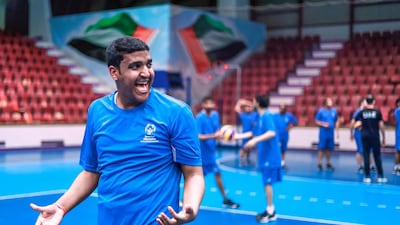Some people might be tempted to describe 2019 as a comparatively quiet year, in terms of global sporting events. In Abu Dhabi, however, it is anything but. Hot on the heels of January’s AFC Asian Cup football tournament, attention is turning to the UAE once again, in anticipation of the Special Olympic World Games.
Today, the Flame of Hope, carried here from Athens, will begin a journey around all seven emirates. The symbolism of this will be lost on no one. Organisers describe the Games as the largest sporting and humanitarian event of the year. Starting on March 14, they will host 7,500 athletes from 192 countries.
The Games are part of the wider Olympic movement, but are profoundly different to the quadrennial Olympic Games and the Paralympics. Both of those events about bringing the world's elite sportsmen together to compete against each other, win medals and, hopefully, break a few records. The Special Olympic World Games are a gathering with altogether different aims.
Participants in the Games are people who live with intellectual disabilities. Down’s syndrome and autism are just two of many conditions represented. Contestants also range from teenagers to pensioners. One member of the 180-strong British delegation that flies out on an Etihad jet on Friday is in his sixties.
Essentially, the movement provides a vital platform for people who may otherwise struggle to find a way into physical sports. Its inclusion in the Olympic family is testament to the enthusiasm and ambition of its organisers, both past and present.
The Special Olympic World Games were founded in 1968 by Eunice and Sargent Shriver. Eunice was a member of the Kennedy family, who, in addition to her own empathy and single-mindedness, provided a contact book packed with influential names.
A forthcoming BBC documentary, timed to coincide with the opening of the Games and narrated by the British TV sports host Clare Balding, goes as far as to describe Mrs Shriver as "the Kennedy who changed the world".
In addition to their inspiring goals, one of the most striking things about the Games is how ground-breaking they were in terms of their structure. Their organisers took an approach that was way ahead of its time, mixing corporate sponsorship and community involvement – a strategy that continues to this day.
At a fundraising event in a central London hotel late last week, leading UAE-linked business figures rubbed shoulders with representatives of the Special Olympic movement and government officials. A charity auction also featured a presentation jersey from Manchester City Football Club as the centrepiece of the bidding.
As Murton Mann, chairman of Special Olympics Great Britain, pointed out, the UAE embassy and Ambassador Sulaiman Al Mazroui have taken the Games to their hearts. So much so that last weekend, as part of ongoing fundraising efforts, UAE embassy employees formed a relay team that cycled more than 500km around the London Olympic Stadium. The distance was the same as the length of the UAE.
During the pre-auction reception, Mr Mann cheerfully drew said that business partners of the Special Olympic movement report that employees participating in its training sessions benefit hugely from the experience. On every level, it’s a cause worth getting involved with.
The British organisation alone comprises 10,000 sportsmen and women. Perhaps even more impressive than that figure is the fact that these athletes are supported by 4,000 volunteers. These numbers illustrate the commitment at the heart of the Games. A dedication that is further exhibited in the 27,000 coaching sessions that are held in the UK every year, across 28 different sports, from football and cycling to badminton and gymnastics.
As with all people who regularly participate in sports, involvement in the Special Olympic programme offers benefits far beyond the physical. Surveys of the athletes have shown positive impact on wellbeing and self-esteem.
Worldwide, there are an estimated 150 million people who could benefit from access to the experiences offered by the movement. To illustrate this, the incalculable value of the movement was captured in a short video of a Team GB member preparing for the Games, shown to all assembled at the auction.
Staring, unblinking from the screen, the man repeatedly said that people stared at him. These words were designed to provoke a sense of sympathy and embarrassment in the viewer. Then the camera cut away to show the very same person, borne in celebration on someone else’s shoulders, amid a sea of people.
He wasn’t a victim, but a victor and the stares he spoke of were motivated by pure admiration. That’s what the Games are all about.

